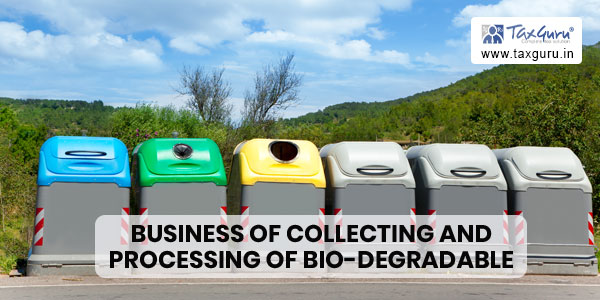Deduction U/S 80JJA: Deduction in respect of profits and gains from business of collecting and processing of bio-degradable waste
Section 80JJA of the Income Tax Act 1961 is an important section that allows an assessee to claim a deduction in respect of profit and gains from the business of collecting and processing of biodegradable waste. This section was introduced to encourage the collection and processing of biodegradable waste, a measure seen as essential for environmental protection. It is a major part of India’s commitment to efficient waste management and the efforts made towards the sustainability agenda.
Bare Act provisions of Section 80JJA
Section 80JJA of the Income Tax Act, 1961 is a provision that allows deduction of profits and gains derived from the business of collecting and processing of bio–degradable waste for the generation of power, producing bio–fertilizers and bio–pesticides, generating bio–gas, making pellets or briquettes for fuel and producing organic manure. This deduction is allowed for a period of five consecutive assessment years beginning with the assessment year relevant to the previous year in which such business commences.

Background
The Income Tax Act, 1961 has various sections to provide tax deductions to businesses in India. Section 80JJA was introduced with effect from 1 April 2009 as a part of the DirectTax Laws Amendment Act, 2009 and was inserted under Chapter VI-A, which talks about deductions for certain incomes. The aim of this provision is to incentivize businesses that are engaged in the collection and processing of biodegradable waste. The Government of India, through this section, has also encouraged businesses to generate alternative sources of energy and increase their contribution towards environmental sustainability.
Key Provisions of Section 80JJA
1. 80JJA is a section of the Income Tax Act, 1961 that allows a deduction of profits and gains derived from the business of collecting and processing or treating of bio-degradable waste for generating power or producing bio-fertilizers, bio-pesticides or other biological agents or for producing bio-gas or making pellets or briquettes for fuel or organic manure.
2. This section provides that the gross total income of an assessee includes any profits and gains that they make from the business of collecting, processing and treating bio-degradable waste.
3. The section entitles the assessee to a deduction of such profits and gains for a period of five consecutive assessment years, starting with the assessment year in which the business commences.
4. The deduction is applicable on the total income of the assessee and is not limited to any specific incomes or sections of income.
5. The deduction is available only to those who are engaged in a business related to bio-degradable waste, and not to other kinds of businesses.
6. The deduction is subject to certain provisions of the Income Tax Act and can be availed only with proof of the eligible expenses incurred for carrying on the business of collection and processing of bio-degradable waste.
7. The deduction can be claimed only for five consecutive assessment years and cannot be carried forward or extended for further assessment years.
8. To avail the benefit of deduction under 80JJA, the assessee should produce the necessary documents and evidence in respect of the eligible expenses incurred in the business and the profits or gains earned.
Implications of Section 80JJA for Businesses
Section 80JJA of the Income Tax Act, 1961 provides businesses in India the opportunity to tap into alternative sources of energy. The provision gives the opportunity to establish such enterprises, provided they fulfil certain conditions stipulated in the Act. The deduction provided under this section helps businesses to gain higher profits, as this reduces the overall tax payable by them. Also, due to the long-term benefit provided under this section, businesses are provided with the confidence to invest in such enterprises and get back returns in the long run.
Conclusion
Section 80JJA of the Income Tax Act, 1961 provides businesses in India the opportunity to tap into alternative sources of energy and incentivizes them to promote environmental sustainability. The impact of this deduction on businesses can be one of increased profits, as it reduces the overall tax liability for the business significantly. It is a welcome move from the Government of India towards encouraging businesses to use biodegradable waste in their production processes and is likely to benefit businesses in various ways in the coming times.
*****
(Author can be reached at email address casharma.sharad2000@gmail.com or on Mobile No. 9990365673)
Disclaimer: “Neither this article nor the information contained herein shall in any way be construed as forming a contract or shall constitute professional advice required before acting upon any matter. CA Sharad Kumar Sharma has taken all due care in the preparation of this article for accuracy in its contents at the time of publication. However, no liability shall be accepted by him in the event of any direct, indirect or consequential damages arising out of or in any way connected with the use of this article or its contents. “





